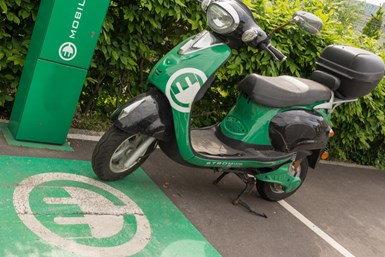Sakuu Launches Multimaterial, Multi-Process 3D Printer for EV Batteries
Multimaterial, multi-process additive manufacturing platform solves issues of performance and cost, using 50% fewer materials to deliver up to twice the energy capacity in the same space or the same energy in half the space.
Share

Sakuu’s new 3D printing process for solid-state batteries may unlock the mainstream adoption of EV and e-mobility vehicles by solving the previous issues of cost, performance, sustainability and range.
Sakuu Corp. (previously KeraCel Inc.), a provider of automated multi-process additive manufacturing (AM), has developed an industrial-grade 3D printer for e-mobility batteries. The company says the technology has the capability to unlock the mainstream adoption of EV and e-mobility vehicles by solving the previous issues of cost, performance, sustainability and range.
The company says the Sakuu AM Platform is the world’s first and only multimaterial, multi-process 3D printer. The multiple-AM technology blends powder bed and jetted material deposition and uses completely different multimaterials in a single-layer capability. The process combines ceramic and metal, as well as Sakuu’s PoraLyte support material, which removes part overhang limitations and enables the easier and faster creation of devices with internal channels and cavities.
The result is a solution that eliminates the shortfalls inherent with existing alternatives — typically low-energy density SSBs that are unsuitable for high-volume production and characterized by thick, brittle ceramic layers and poor interface. Instead, Sakuu’s AM platform is designed to deliver higher energy density SSBs with thin monolithic layers and seamless interface.
The Sakuu AM platform is said to offer an industrial-scale, ‘local’ battery production capability. This multimaterial, multi-process AM platform solves issues of performance and cost, using 50% fewer materials to deliver up to twice the energy capacity in the same space or the same energy in half the space. It also enables high-volume production of complex functional devices for a host of other applications, the company says.
The platform is also said to enable fast and high-volume production of 3D printed solid-state batteries (SSBs) that, compared to lithium-ion batteries, have the same capacity yet are half the size and almost a third lighter.
According to the company, its KeraCel-branded SSBs use around 30-50% fewer materials — which can be sourced locally — to achieve the same energy levels as lithium-ion options, thereby significantly reducing production costs. Additionally, Sakuu’s SSBs are said to offer improved safety and sustainability benefits.
Related Content
-
This Drone Bird with 3D Printed Parts Mimics a Peregrine Falcon: The Cool Parts Show #66
The Drone Bird Company has developed aircraft that mimic birds of prey to scare off problem birds. The drones feature 3D printed fuselages made by Parts on Demand from ALM materials.
-
8 Cool Parts From Formnext 2024: The Cool Parts Show #78
End-use parts found at Formnext this year address various aspects of additive's advance, notably AM winning on cost against established processes.
-
3D Printed Lattice for Mars Sample Return Crash Landing: The Cool Parts Show Bonus
NASA Jet Propulsion Laboratory employs laser powder bed fusion additive manufacturing plus chemical etching to create strong, lightweight lattice structures optimized to protect rock samples from Mars during their violent arrival on earth.